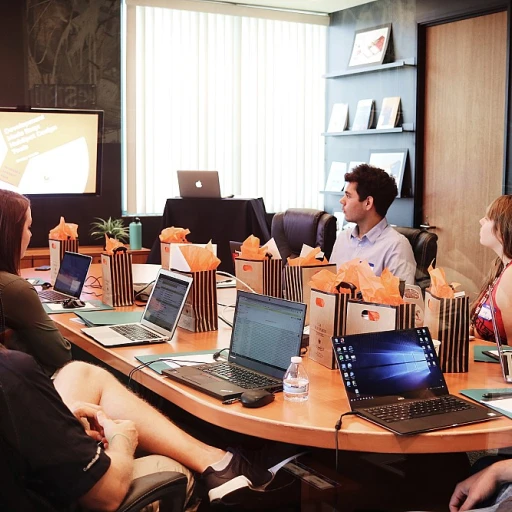
Understanding Evolved HR
Recognizing the Evolution of Human Resources
The realm of human resources (HR) is not static—it is an ever-evolving discipline that continuously adapts to meet the demands of a dynamic business landscape. The evolution of HR signifies a shift from traditional administrative functions toward becoming a strategic partner in business operations, balancing economic imperatives with the human element. This transformation aligns with the overarching goal of fostering organizational success while maintaining employee engagement and wellbeing. Today's evolved HR focuses on strategic elements such as talent management and acquisition, leadership development, and enhancing the employee experience. It operates at the intersection of company growth and human potential, where resources are managed not just as functional assets but as integral contributors to a company's long-term prosperity. For insights on how international laws interplay with these strategies, see more about the influence of international environmental laws on business operations. In the context of evolving HR practices, businesses are tuning their HR functions to nurture a workplace culture that is not only inclusive and flexible but also primed for adapting to change. This emphasis on cultural evolution ensures that a company’s values resonate with both its internal workforce and external stakeholders, positioning them for success amidst shifting market expectations. As we delve deeper into this article, we will uncover how technology catalyzes this evolution, explore innovative HR strategies, and examine the organizational challenges encountered in implementing evolved practices. Ultimately, this journey through evolved HR reveals how embracing change can lead to profound impacts on both business operations and the broader company culture.The Role of Technology in HR Evolution
The Influence of Emerging Technologies in Human Resources
In the dynamic landscape of business management, the integration of technology into human resources is fostering significant growth and evolution. Technology's infiltration into the HR sector has revolutionized the way companies approach their workplace, catalyzing what many refer to as an "evolved human resources" environment.
Thanks to advancements in digital tools, organizations now have the means to manage their talent acquisition with unparalleled efficiency. Technologies such as AI, machine learning, and data analytics have become strategic assets in the modern HR toolkit. These tools enhance employee engagement, streamline the talent management process, and aid in identifying potential leadership within an organization.
For instance, AI-driven platforms enable the analysis of employee behaviors and preferences, offering insights that support leadership management and business strategy development. When businesses embrace these tech-driven changes, they do so with the expectation of improved employee well-being and a more cohesive company culture.
However, the incorporation of technology into HR practices isn't without its challenges, as businesses must navigate hurdles such as privacy policy regulations and data security. Explore essential reads to further understand how these technological advancements are affecting change management within the human resources domain.
These changes are contributing to an evolved HR landscape that prioritizes strategic alignment with overall organizational success and growth. HR professionals today function as strategic partners who guide companies through the complexities of an ever-evolving digital workplace.
Innovative HR Strategies
Revolutionary HR Approaches
In the rapidly transforming realm of human resources, innovative strategies are no longer optional but a necessity for thriving in the modern workplace. Businesses are moving beyond traditional HR frameworks, embracing evolved methodologies that cater to the dynamic needs of their workforce. This shift is fueled by a desire for sustainable growth, effective talent management, and enhanced employee engagement. One key strategy is the integration of HR as a strategic partner in the wider business strategy. This involves aligning HR initiatives with core company goals, fostering synergies that drive organizational success. HR functions have evolved into more than just administrative roles; they are now pivotal in shaping long-term company culture and leadership management. Moreover, businesses are focusing on nurturing human talent by adopting nimble talent acquisition practices. By prioritizing skills and potential over experience, companies can chase the best and brightest, ensuring a diverse and innovative team. A robust talent management strategy is essential for sustaining collective progress and maintaining a competitive edge. Employee well-being has also emerged as a crucial element of modern HR strategies. Progressive companies recognize the profound impact of employee well-being on productivity and retention. Implementing employee-centric policies, such as flexibility in work arrangements and mental health initiatives, significantly bolsters employee satisfaction and loyalty. Lastly, a successful evolved HR strategy emphasizes a culture of continuous learning and development. Encouraging professional growth not only enhances individual capabilities but also contributes to overall organizational success. By fostering a learning-oriented workplace culture, businesses can seamlessly adapt to industry shifts while maintaining a motivated workforce. For a deeper exploration into effective HR strategies, consider attending events like the KPMG Rise Leadership Conference, where leaders gather to exchange insights and drive innovation in human resources management.Challenges in Implementing Evolved HR
Overcoming Hurdles in Evolved HR Implementation
As businesses strive to embrace evolved human resources, they often encounter a series of challenges that can impede progress. Understanding these hurdles is crucial for effective change management and ensuring long-term success in the modern workplace.
Resistance to Change
One of the most significant obstacles is resistance to change. Employees and leadership may be hesitant to adopt new HR strategies, fearing disruptions to established workflows. To mitigate this, companies need to foster a culture that values innovation and encourages open communication. Leadership management plays a pivotal role in guiding teams through transitions, ensuring that everyone understands the benefits of evolved HR practices.
Integration of Technology
Another challenge lies in integrating technology into HR functions. While technology can enhance talent management and employee engagement, it requires careful planning and execution. Businesses must invest in training programs to equip their teams with the necessary skills to utilize new tools effectively. Additionally, addressing privacy policy concerns is essential to maintain trust and protect employee data.
Aligning with Business Strategy
Aligning evolved HR initiatives with the overall business strategy is crucial for organizational success. HR must function as a strategic partner, ensuring that talent acquisition and management efforts support the company's long-term goals. This alignment helps in creating a cohesive company culture that drives growth and innovation.
Maintaining Employee Well-being
In the pursuit of evolved HR, companies must not overlook the importance of employee well-being. Balancing technological advancements with human-centric approaches is vital to maintaining a healthy workplace environment. By prioritizing employee well-being, businesses can enhance engagement and productivity, ultimately contributing to organizational success.
Addressing these challenges requires a strategic approach and a commitment to continuous improvement. By embracing evolved HR, companies can position themselves for growth and success in an ever-changing business landscape.
The Impact on Organizational Culture
Transforming Company Culture
As human resources continue to evolve, the impact on organizational culture is profound. The shift towards a more strategic and evolved HR function means that companies are now focusing on creating a workplace culture that fosters growth and innovation. This transformation is not just about implementing new technologies or strategies; it's about redefining the very essence of what a company stands for.
Leadership and Employee Engagement
Leadership management plays a crucial role in this cultural shift. Leaders are now seen as strategic partners who drive change management and inspire their teams. By prioritizing employee engagement and talent management, companies can create an environment where employees feel valued and motivated. This focus on employee well-being is essential for long-term success and organizational growth.
Challenges and Opportunities
While the benefits of an evolved HR approach are clear, there are challenges in implementing these changes. Companies must navigate the complexities of talent acquisition and privacy policy while ensuring that their business strategy aligns with their cultural goals. However, these challenges also present opportunities for companies to innovate and differentiate themselves in the modern workplace.
Building a Culture of Success
Ultimately, the goal of evolved HR is to build a company culture that supports organizational success. By embracing change and focusing on the human aspect of business, companies can create a workplace where people thrive. This cultural evolution is not just a trend; it's a necessary step towards achieving sustainable success in today's competitive landscape.
Future Trends in Evolved HR
Anticipating Tomorrow's HR Landscape
The future of human resources is poised to undergo significant transformations, driven by technological advancements and evolving business needs. As companies chase growth and strive for organizational success, the role of HR as a strategic partner becomes increasingly crucial. In this modern workplace, HR professionals must adapt to new paradigms that emphasize employee engagement, talent management, and company culture.
Embracing Technological Advancements
Technology continues to be a catalyst for change in HR functions. From AI-driven talent acquisition to sophisticated employee well-being platforms, the integration of technology is reshaping how businesses manage their human resources. This evolution not only enhances efficiency but also allows for a more personalized approach to employee management, aligning with the strategic goals of the company.
Shifting Focus to Employee Experience
As organizations recognize the importance of employee engagement, the focus is shifting towards creating a positive employee experience. This involves understanding the needs and aspirations of employees, fostering a supportive company culture, and implementing policies that promote work-life balance. By prioritizing employee well-being, companies can enhance productivity and retain top talent.
Adapting to a Dynamic Workforce
The workforce is becoming increasingly diverse and dynamic, with employees seeking more flexibility and autonomy. HR leaders must adapt to these changes by implementing policies that accommodate remote work, flexible schedules, and diverse talent pools. This approach not only supports employee satisfaction but also positions the company as an employer of choice in a competitive market.
Long-Term Strategic Planning
For HR to remain relevant and effective, it must align with the long-term business strategy. This involves anticipating future trends, such as the rise of gig economy workers and the increasing importance of data-driven decision-making. By staying ahead of these trends, HR can continue to drive organizational success and support the company's growth objectives.













